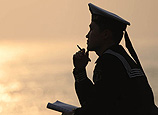
Japanese government is reported to decide not to publish the "related evidences collected by the Self-Defense Forces (SDF) about Chinese ships using the fire control radar (FCR) against its warships". As the villain always files the suit first, Japan recently tried to hype up the FCR incident, which brings up three doubtful issues.
First of all, this incident reflects the fact that Japanese military and political officials are short of military common sense. Japan claimed that "its frigate was aimed at by a Chinese frigate's FCR at the distance of 3 kilometers in the open waters of the East China Sea at 10:00 a.m. on January 30". What does it mean by three kilometers? It is the distance perceivable to naked eyes which doesn't even need the radar to give the instructions for the ship-borne gun to shoot the target. Why does the Chinese frigate bother to use the FCR? Even if it is supposed that the radar was used to give the guided missile instructions about the target, anyone with a little military common-sense would know that three kilometers fall into the blind zone of the guided missile's firing range. Within such a close distance, the guided missile cannot effectively find the target even with the use of the FCR, let alone posing any threat. Who would do such a silly thing?
Second, it would have been a dereliction of duty if our warships were not being alert and sent warning while military aircraft and warships were so close to confrontation. Should our warships just stay there like a sitting duck watching Japanese military aircraft and warships conducting close-in monitoring and surveillance near our fleet? If we didn't initiate search and surveillance radar, then weren't our warships just waiting to be attacked and perish? With the knowledge that Japan had previously just threatened to launch warning shots at our warships, who would know whether we were going to meet with live ammunition or warning shells? We should act to defend ourselves.
Third, if a military conflict did occur, who should be responsible for it? There is no doubt that Japan should take up the responsibility. Since our fleet was conducting normal training in international open waters, on what ground should Japan perform close-in monitoring and surveillance on us and interfere with the normal navigation of our fleet? Such interferences have occurred more than a few times. Each year, around 500-plus Japanese aircraft conduct close-in monitoring and surveillance on our fleets, and Japanese warships often stalk and interfere with our fleets' navigation. Any country would consider such behaviors as military provocations. Besides, Japanese military aircraft also play around with some dangerous maneuvers from time to time. For instance, a Japanese F-15J fighter recently flew by the wing of our Y-8 patrol airplane only five meters away. A slightest mistake would have resulted in the crash of the aircraft and the death of the pilots.
Who made the rule that allows only Japan to make provocations while we are forbidden to defend ourselves? Japan should be told that we were lenient this time because we did not direct the FCR on its aircraft. However, this does not mean that we will not direct our FCR at it in the future. As long as you are posing any threat to us, we will carry out warning and expelling moves at an appropriate distance (not within the 3-kilometer dead angle and blind zone as claimed by Japan). If Japan does not listen, then we will use the FCR to lock on it as a target directly. If it dares to make any dangerous moves, we will resolutely defense ourselves without compromise.
Why should Japan have the final say on determining the rules of the game in the East China Sea, allowing it to set up air defense identification zone and fire warning shots? Japan should know that setting up air defense identification zone is not Japan's exclusive privilege. Nor is the firing of warning shots. We can also set up air defense identification zone and fire warning shots.
We should set up rules in the East China Sea for Japan to stay far away from China's safety range.
By Luo Yuan, executive vice president of the China Strategy and Culture Promotion Association
















 A 9-year-old son takes good care of his amputee mother: "adults have a priority over delicious meals"
A 9-year-old son takes good care of his amputee mother: "adults have a priority over delicious meals"


![]()
